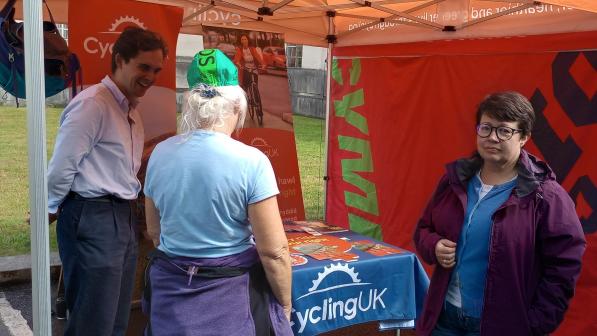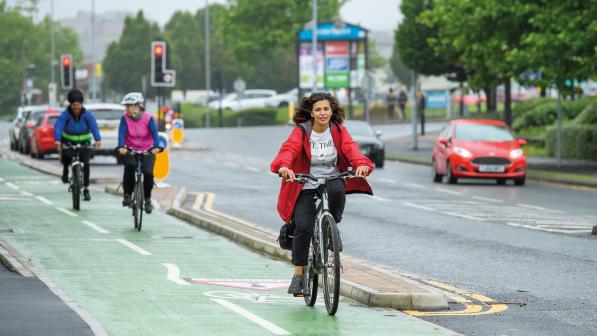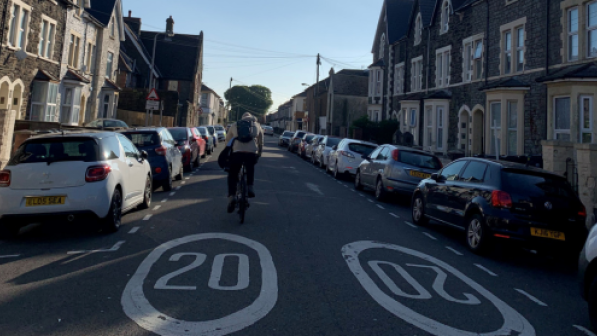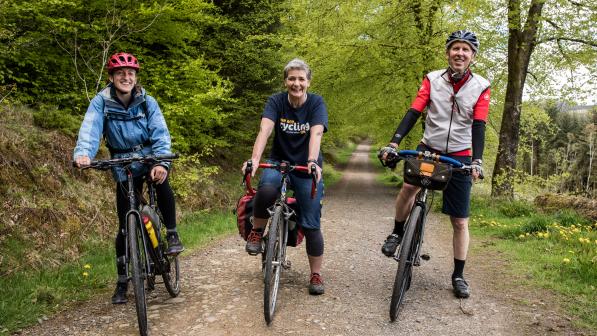Safe, accessible and inclusive – making the case for active travel in Wales

Last week was a busy one for Cycling UK Cymru, as we headed to the Welsh Labour Party Conference in Llandudno for another walk and talk event on Saturday 28 June, before making our way to Cardiff Bay on Tuesday 1 July for the third Rhiannon Jade Smith Road Safety Conference.
At both events, we shared our key messages on the importance of safe, accessible and inclusive walking and cycling infrastructure - and the urgent need to protect and prioritise funding for active travel ahead of the 2026 Senedd election.
We were particularly proud to see our CEO, Sarah Mitchell, speaking to the conference floor in Cardiff about ‘My ride. Our right’, bringing the voices of women who travel actively into the spotlight.
Walking and talking in Llandudno
Despite the threat of rain for a second successive year, a small but dedicated group gathered on the roomy Llandudno promenade for our walk and talk event.
It was co-organised with Sustrans Cymru, and we were pleased to be joined again by John Griffiths MS, a long-standing supporter for walking, wheeling and cycling, who will be standing down at next year’s election.
John spoke powerfully about the importance of continuing the progress made in Wales on active travel, into the 2026 election and beyond.

It was also encouraging to hear from Huw Thomas, Leader of Cardiff Council, who offered thoughtful reflections on how we frame the benefits of active travel. He spoke about Cardiff’s impressive progress on this and the benefits to high streets and local economies that improved active travel brings.
As the election creeps towards us, we will be ramping up our work to connect with candidates and work with the major parties on their manifesto commitments.
Cycling UK at the Rhiannon Jade Smith Road Safety Conference
A few days later, we set up our stand at the third Rhiannon Jade Smith Road Safety Conference in Cardiff Bay, attended by policymakers, road safety campaigners and sector professionals.
The day featured a wide-ranging programme of talks, from the lessons of the 20mph rollout to rural road safety, graduated driving licences and the future of transport in Wales.
In the afternoon, CEO Sarah Mitchell delivered a keynote titled ‘My ride. Our right’ to an engaged audience. The speech highlighted the barriers that women face when cycling or walking, and the simple, effective changes that could make streets feel safer and more welcoming.
It was a powerful reminder that the right to travel actively is not shared equally, and that issues of personal safety, access to safe routes and inclusive infrastructure must be central to our transport ecosystem.

We also had the chance to speak to a range of attendees throughout the day at our stand, including Plaid Cymru’s transport spokesperson Peredur Owen Griffiths MS.
These conversations reinforced that there is genuine cross-party support for making roads safer for everyone, including cyclists, and we were pleased to hear strong recognition of the role that active travel plays in a safer, healthier Wales.
Funding at a crossroads
One message we emphasised throughout both events is that while Wales has made great strides on active travel, the future now hangs in the balance. Our main concern is no longer immediate budget cuts, after the Welsh Government recently confirmed a smaller than expected cut in active travel investment, it’s the uncertainty about what comes next.
Currently, the Welsh Government manages what essentially amounts to a ring-fenced active travel fund. That means money is specifically protected for cycling and walking infrastructure.
However, soon decisions about funding will be being passed to four regional organisations called Corporate Joint Committees (CJCs), and the funding will no longer be ring-fenced. This creates a risk: without clear national direction, there’s no guarantee that local decision-makers will give active travel the priority it needs.
At the same time, the political landscape is shifting. The next Senedd election in May 2026 could result in a dramatic change of makeup and leadership, potentially the first major change since the Senedd was established in 1999 – and the level of political commitment to active travel may change with it.

We know that walking and cycling make Wales healthier, fairer and greener. But unless those benefits are backed by consistent investment and clear political will, progress will likely stall, and we may be left in a no-man’s land for cycling.
Why active travel matters now more than ever
Safe walking and cycling routes don’t just reduce road danger. They connect people to jobs, schools and health services, help reduce congestion and air pollution, and tackle the inequality faced by people who can’t afford or choose not to drive.
Investing in active travel is not just a transport decision – it’s an investment in public health, economic inclusion and climate action. For many communities, particularly rural ones, active travel is one of the few affordable and sustainable transport options available.
Removing certainty around funding and pushing decisions to bodies without a proven track record on active travel, risks widening the gap between areas with good infrastructure and those without.
Looking ahead
We came away from both conferences energised by the enthusiasm we heard from politicians, local government leaders and campaigners alike. But there’s much more to do.
We’ll be following up with Members of the Senedd and parliamentary candidates over the coming months to ensure active travel stays high on the political agenda in a positive way.
Cycling UK will continue working in coalition with partners to make sure that walking and cycling are at the heart of transport planning in Wales. We’ll keep championing the Active Travel Act, pushing for funding that matches its ambition, and making sure every voice – especially those often left out of the conversation – is heard loud and clear.



